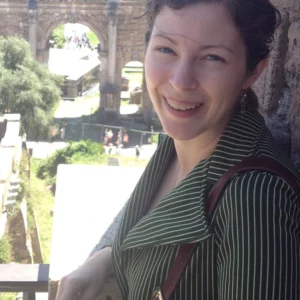Plato’s Gorgias
Reflect on the ethical dilemmas implied by the pursuit of power.
Wednesdays | Jan. 7–Feb. 11, 2026
Online
Protagoras, a Sophist of fifth century BCE Greece, may be most famous (or infamous) for this dictum: “Man is the measure of all things.” But as Protagoras, the eponymous character in Plato’s dialogue, he hangs his reputation on his ability to teach politike techne, which may be translated as the political art or even civic virtue. Plato’s Protagoras is a self-proclaimed forefather of civic education.
What is the relationship between sophistry and civic education? Is virtue able to be taught? Is there truly an art to politics or a science of politics? These questions receive a rich and complex treatment from Protagoras and Socrates as they debate one another before the most politically promising youths of Athens. Accordingly, this seminar will attend to both the arguments and action of the dialogue in pursuit of these questions.
Image: Temple of Apollo Epikourios, Bassae, details of a Corinthian isolated column in the interior, 1860
A Hertog Conversation with Mary Townsend on Plato's Protagoras
This course is offered by Humanities at Hertog. It takes place weekly on Wednesdays, via Zoom, from 6:30 PM to 8:30 PM ET. Fellows will receive a $150 Amazon Bookshelf voucher contingent upon participation in the course and completion of a brief response paper. All course materials will be provided.

Mary Townsend is an associate professor of philosophy at St. John’s University, Queens, NY. Her 2017 book, The Woman Question in Plato’s Republic was named required reading by University of Pennsylvania’s Emily Wilson, translator of Homer’s Iliad and Odyssey, and her academic work on Plato, Beauvoir, and the American abolitionist Julia Ward Howe has appeared in Hypatia, Polis, and Social Philosophy Today.

Mary Townsend is an associate professor of philosophy at St. John’s University, Queens, NY. Her research interests include political and moral psychology ancient and modern, existentialism from Kierkegaard to Simone de Beauvoir, and the history and politics of feminist philosophy. Her 2017 book, The Woman Question in Plato’s Republic was named required reading by University of Pennsylvania’s Emily Wilson, translator of Homer’s Iliad and Odyssey, and her academic work on Plato, Beauvoir, and the American abolitionist Julia Ward Howe has appeared in Hypatia, Polis, and Social Philosophy Today. Dr. Townsend has also written on philosophy and culture for The Atlantic, The Hedgehog Review, Gawker, The Bulwark, Wisdom of Crowds, Plough Quarterly, and Commonweal on topics ranging from moral relativism, effective altruism, desire and the mind/body split, mental health, and the political psychology of democracy.
Readings:
Discussion Questions:
Readings:
Discussion Questions:
Readings:
Discussion Questions:
Readings:
Discussion Questions:
Readings:
Discussion Questions:
Readings:
Discussion Questions:

Benjamin Storey
Benjamin Storey is a senior fellow in Social, Cultural, and Constitutional Studies at the American Enterprise Institute (AEI), and co-director of AEI’s Center for the Future of the American University. He is concurrently an SNF Agora Fellow at Johns Hopkins University and a research fellow at the Civitas Institute at the University of Texas at Austin.

Jacob Howland
Jacob Howland has published five books and roughly 60 scholarly articles and review essays on the thought of Plato, Aristotle, Xenophon, Kierkegaard, the Talmud, the Holocaust, ideological tyranny, and other subjects. His most recent book is Glaucon’s Fate: History, Myth, and Character in Plato’s Republic.

Mary Elizabeth Halper
Mary Elizabeth Halper is Dean of the Humanities at Hertog program and a tutor at St. John’s College, Annapolis. Previously, she was Associate Director of the Hertog Foundation. She graduated with B.A.s in Philosophy and Classics from the University of Dallas and has since been devoted to liberal education in various forms.

Robert C. Bartlett
Robert C. Bartlett is the Behrakis Professor of Hellenic Political Studies at Boston College. His principal area of research is classical political philosophy, with particular attention to the thinkers of ancient Hellas, including Thucydides, Plato, and Aristotle. He is the co-translator of a new edition of Aristotle’s Nicomachean Ethics.

Mary P. Nichols
Mary P. Nichols is Professor Emerita of Political Science at Baylor University. She is author of Thucydides and the Pursuit of Freedom, and Socrates on Friendship and Community: Reflections on Plato’s Symposium, Phaedrus, and Lysis. She has delivered lectures on ancient political theory, Shakespeare, and film.

Shilo Brooks
Shilo Brooks is Executive Director of the James Madison Program in American Ideals and Institutions and Lecturer in the Department of Politics. He is author of Nietzsche’s Culture War, in addition to scholarly and journalistic articles on a variety of topics in politics and the humanities. His teaching and research interests lie in the history of political philosophy, politics and literature, and statesmanship.

Jenna Silber Storey
Jenna Silber Storey is a senior fellow in the Social, Cultural, and Constitutional Studies department at the American Enterprise Institute (AEI), and co-director of AEI’s Center for the Future of the American University. She is concurrently an SNF Agora Fellow at Johns Hopkins University, and a research fellow at the Civitas Institute at the University of Texas at Austin. She also serves on the executive committee of the Alliance for Civics in the Academy.